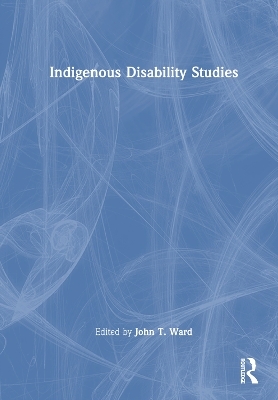
Indigenous Disability Studies
Routledge (Verlag)
978-1-032-65650-2 (ISBN)
By including various knowledge systems related to social-cultural, traditional governance, spirituality, educational, and self-representation within a communal understanding, the knowledge brought forth will be a combination of information from within/communal and outwards/infusion by Indigenous teachers, scholars, academics, and professionals who aim to combat the negative effects of disability labels and policies that have regulated Indigenous peoples.
Comprised of five sections:
The power, wisdom, knowledge, and lived experiences of Elders
Reframing the narrative – Navigating self-representation
Learning from within – Including traditional knowledge
Challenging colonial authority – Infusing regional ideals and concepts
Interpretations, narratives, and lived experiences of grassroots teachers and social service providers
It will be an asset to those who seek out a deeper understanding of the complexity of Indigenous people and their knowledge, including anyone who deals with predominantly non-Indigenous mindsets and barriers to education.
Courses on disability studies, Indigenous studies, social work, health, education, and development studies will all benefit from this book.
John T. Ward is a Métis and Non-Status Indian from the Algonquin territory of Kitchisibi. His specialization is Indigenous wholistic knowledge, ethics, disabilities, learning disabilities, and dyslexia among Indigenous people in Canada. He also works as a special advisor in disability and Indigenous knowledge in the Government of Canada.
0.Introduction. Part I – The power, wisdom, knowledge, and lived experiences of Elders. 1.The colonial education system – Teaching Indigenous children with learning differences. 2.St. Anne's Indian Residential School – How labelling contributed to disabilities. 3.Interpreting Disabilities from a Mohawk Perspective: Elder Guidance when navigating the dreamworld. 4.Disability Interpretation from colonial insight to Indigenous spirituality: A Ihanktonwan Dakota and Chickasaw realization. 5.An Eskimo’s lived experience of disabilities – Elder, advocate, leader, and dialogue builder. 6.Perspectives of disability in the Yukpa Peoples of Venezuela and Colombia from an Indigenous psychological perspective. Part II – Reframing the narrative – Navigating self- representation. 7.To see or not to see: Am I blind or is that just another colonial label. 8.Reframing the narrative — navigating self-representation: Indigenous Deaf people. 9.Neurodiversity from an Indigenous perspective: Honouring the Seven Grandfather Teachings. 10.Navigating my Indigeneity through colonialism and how disabilities impacted my knowledge systems: A Muiscas and Teusacá experience. 11.Navigating Disabilities from a Mauritius Perspective. 12.Reframing the narratives of Indigenous person with disabilities and creating inclusive spaces through advocacy. 13.Old meets new – Moving forward with the colonial mindset of disability – A Kabyle perspective. Part III – Learning from within – Including traditional knowledge. 14.The importance of Indigenous sign languages on the cultural empowerment of Deaf Indigenous people. 15.Learning from traditional knowledge: Basotho Indigenous epistemology of disability. 16.Half Man of Spring Bayou: Understanding and living with mild Cerebral Palsy through traditional Indigenous knowledge. 17.The strength, wisdom, and resilience of traditional knowledge as a cultural approach to modern day living in Northern Canada an Inuk perspective. 18.From linguistic disability to linguistic diversity case studies of Taiwanese Indigenous peoples. 19.Mushi and Muhavu beliefs, understandings, teachings, and traditional knowledge of disabilities. 20.Language structure or a language-based disability (dyslexia) – how natural learning contributed to being disabled. Part IV - Challenging colonial authority – Infusing regional ideals and concepts. 21.Disability support for Indigenous people: The Sweetgrass Method. 22.Indigenous Peoples with Disabilities in Taiwan: The Experiences of Paiwan People. 23.Difference wisdom: Reimagining disability dialogue. 24.The birth and care of Määt Jääy in a context of structural violence, “disability” in a Mixe town in Oaxaca. 25.We belong to you, but you don’t represent us a Javanese (Indonesian) experience of disabilities. 26.Understanding Indigenous disabilities: A cultural perspective of Indigenous Pashtun community. 27.Intersectionalities of Indigenous Disabilities: Breaking down colonial barriers. Part V - Interpretations, narratives, and lived experiences of grassroots teachers and social service providers. 28.Disabilities in Uganda: Understanding community challenges and barriers. 29.Disabilities in Malawi: A cultural and social perspective as influenced by colonialism. 30.Society’s manner towards disabilities: A perspective from India. 31.Taking Care of Disability People in Kenya. 32.Conditions of disabilities in Uganda. 33.Weaving a Human-Centric tapestry: A Rwandan perspective. x.Conclusion
| Erscheinungsdatum | 10.07.2024 |
|---|---|
| Zusatzinfo | 5 Tables, black and white; 3 Line drawings, black and white; 34 Halftones, black and white; 37 Illustrations, black and white |
| Verlagsort | London |
| Sprache | englisch |
| Maße | 174 x 246 mm |
| Gewicht | 820 g |
| Themenwelt | Studium ► Querschnittsbereiche ► Prävention / Gesundheitsförderung |
| Sozialwissenschaften ► Ethnologie | |
| Sozialwissenschaften ► Soziologie ► Spezielle Soziologien | |
| ISBN-10 | 1-032-65650-6 / 1032656506 |
| ISBN-13 | 978-1-032-65650-2 / 9781032656502 |
| Zustand | Neuware |
| Informationen gemäß Produktsicherheitsverordnung (GPSR) | |
| Haben Sie eine Frage zum Produkt? |
aus dem Bereich


